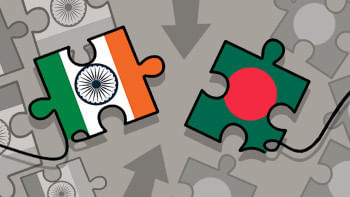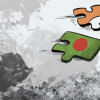Bangladesh’s strategic crossroads in 2025 and beyond

Amid global geopolitical shifts, there is a fascinating parallel between modern developments and ancient end-time prophecies. Islamic eschatology—which foresees an alliance between the Muslim world and the Roman Empire (current Christian world or its subset) against a common adversary—offers a thought-provoking lens through which we can look at the shifting alliances between East and West today. Whether this ally or adversary is symbolised by Orthodox Russia or the Catholic/Protestant West (EU/US), the essence of these historical and eschatological narratives alludes to a deep, enduring alliance between Muslims and Eastern/Western powers. As power dynamics in the global arena continue to evolve, Bangladesh stands at a crucial juncture in the emerging contest between the US/EU-led West and the Russia/China-led East, as both vie for closer ties with the Islamic world. In this new geopolitical order, Bangladesh, with its rising economic clout, strategic location, and cultural connections, is uniquely positioned to play an important role both as a leader in the Muslim-majority world and as a mediator between East and West.
This potential harks back to the transformation seen in the US-Japan relationship following World War II. Once bitter enemies—marked by Japan's attack on Pearl Harbor and the US's atomic bombings of Hiroshima and Nagasaki—the two nations forged one of the strongest alliances of the 20th century. This remarkable reconciliation was driven by mutual recognition of shared interests and pragmatic cooperation, particularly in the areas of economic growth and security. The US-Japan alliance thus emerged as a cornerstone of stability in the Indo-Pacific. Similarly, Bangladesh, despite its historical tensions with Pakistan and regional challenges, has the opportunity to transcend past conflicts and build new alliances that emphasise mutual benefits, particularly in trade, security, and energy. Just as the US and Japan rose from the ashes of war to become strong allies, Bangladesh, along with its promising neighbours, could forge partnerships that not only promote regional stability but also enhance the country's global standing.
To that end, Bangladesh's policy in 2025 and beyond must be one of strategic pragmatism, recalibrating alliances to safeguard its interests and promote long-term prosperity. It should engage in a multi-faceted approach, strengthening its relationships with regional neighbours like Nepal, Bhutan, Pakistan, Afghanistan, Sri Lanka, and the Maldives. These countries, often overlooked in traditional discussions on South Asia's geopolitical landscape, hold immense potential for mutually beneficial partnerships that can enhance Bangladesh's regional influence.
For example, Nepal and Bhutan offer untapped opportunities in the energy sector. With Bhutan's vast hydropower resources and Nepal's potential for renewable energy, Bangladesh can diversify its energy sources through collaborative initiatives that provide sustainable solutions for all parties. Already, Bangladesh's role in providing educational opportunities to Nepali students, particularly in medicine, has quietly fostered deeper ties, with these graduates addressing healthcare shortages in Nepal and serving as cultural and professional bridges between the two countries, thereby strengthening Bangladesh's soft power and bilateral relations.
Similarly, Bangladesh's relationship with Pakistan, despite historical tensions stemming from the 1971 war, holds significant promise for future cooperation. While these two nations have long been relatively estranged, focusing on shared interests such as trade, infrastructure development, and climate resilience could serve as the foundation for a renewed relationship. Pakistan's nuclear expertise, for instance, could help Bangladesh expand its energy portfolio through civilian nuclear cooperation, enhancing energy security within the framework of international regulations much like the collaborations seen between historically adversarial states like India and the US in their landmark 2008 nuclear deal.
Bangladesh has a unique opportunity to strengthen diplomatic ties with smaller neighbours like Sri Lanka and the Maldives by offering expertise in areas such as disaster management and climate change adaptation. Leveraging its experiences in managing the Rohingya crisis and the Delta Plan, Bangladesh can solidify its role as a regional strategic leader.
At the same time, Bangladesh's relationship with India, its largest and most influential neighbour, remains pivotal in shaping its regional strategy. Although this relationship has faced challenges following the fall of Awami League in August, the two countries share common security concerns and economic interests that necessitate collaboration. Longstanding issues over water sharing, border disputes, and trade imbalances should be addressed through sustained diplomatic engagement. As I have noted in a recent column, India cannot afford to undermine Bangladesh. Fostering a balanced partnership is vital not only for our bilateral well-being but also for broader regional stability in South Asia.
Moreover, Bangladesh has a unique opportunity to strengthen diplomatic ties with smaller neighbours like Sri Lanka and the Maldives by offering expertise in areas such as disaster management and climate change adaptation. Leveraging its experiences in managing the Rohingya crisis and the Delta Plan, Bangladesh can solidify its role as a regional strategic leader.
On the global stage, Bangladesh must maintain and even expand its relationships with powers such as the US, EU, Russia, and China while avoiding over-reliance on any single power or market. The US and EU remain vital trade partners, especially for Bangladesh's garment industry, with the EU's GSP facility playing a crucial role in its growth. However, as global competition for influence intensifies, Bangladesh must diversify its diplomatic and economic ties, engaging with both Western and Eastern blocs while preserving its autonomy and flexibility. While China's investments through the BRI initiative are significant, Bangladesh must learn from the experiences of other countries burdened by Chinese debt and avoid excessive dependence. A balanced approach to these relationships will enable Bangladesh to navigate its way through an increasingly complex geopolitical environment, and maximise its economic potential while safeguarding its sovereignty.
Beyond global partnerships, Bangladesh's role as a mediator between other regional powers could become one of its most significant geopolitical assets. Positioned as a neutral party, Bangladesh can facilitate dialogue between Saudi Arabia and Iran, two rivals whose tensions have long destabilised the Middle East. As a moderate and the third-largest Muslim country in the world, Bangladesh can leverage its diplomatic relationships with both nations to foster greater unity in the Muslim world, thus positing itself as a unifying force. Through active participation in organisations like the OIC and the D-8, Bangladesh can also advocate for greater economic cooperation, climate resilience, and solidarity on issues such as Palestine, enhancing its influence within the Islamic world and beyond.
This realignment would elevate Bangladesh's standing in global discussions on justice, peace, and sustainable development. As both the West and East seek closer ties with the Islamic world, Bangladesh, with its growing influence and strategic importance, stands at the crossroads of this emerging shift. By positioning itself as a diplomatic bridge between the Islamic world and both Western and Eastern blocs, it can catalyse cooperation and assert its influence in shaping the evolving global order.
Dr Iftekhar Ul Karim is assistant professor at BRAC Business School, BRAC University. He can be reached at [email protected].
Views expressed in this article are the author's own.
Follow The Daily Star Opinion on Facebook for the latest opinions, commentaries and analyses by experts and professionals. To contribute your article or letter to The Daily Star Opinion, see our guidelines for submission.

 For all latest news, follow The Daily Star's Google News channel.
For all latest news, follow The Daily Star's Google News channel. 










Comments